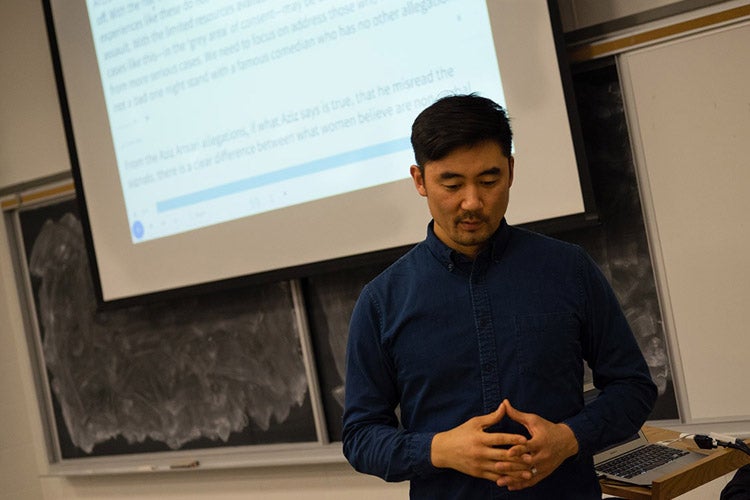Your voice matters: Course evaluations help U of T faculty improve teaching

Published: November 30, 2018
Sarah Cox will never forget sitting in her first-year sociology course at University of Toronto Scarborough, building snowmen out of playdough with her classmates.
There were hundreds of students in the class, taught by Assistant Professor Kathy Liddle, but this fun, creative exercise gave the massive – and potentially intimidating – course a personal touch.
Students learned about different economic models like capitalism and Marxism by building snowmen in different ways – first building them start to finish on their own, then creating an assembly line with one person serving as an overseer and the other students working to complete one part of the production process each to see how that changed the level of productivity.
“It was very interactive and wasn't just someone talking to you about an issue,” says Cox, who is in her second year at U of T Scarborough studying human biology, public policy, and conservation and biodiversity.
Cox’s experience in Liddle’s class is telling of the lasting impact university courses can have on students. But those amazing experiences aren’t always communicated to faculty members.
That’s where course evaluations come in.
Course evaluations are an important opportunity for students to provide confidential feedback to faculty members about the classes they teach. It’s a way to let instructors know about the things that worked – and didn’t work – helping them to improve their courses each semester.
Students can access their course evaluations through Quercus for their fall semester courses.
Complete your course evaluations online here
When Neda Maghbouleh began teaching at U of T, she was assigned to one of the first-year introductory sociology courses. It was “not necessarily a class faculty want to teach or students want to take,” says the assistant professor of sociology at U of T Mississauga and on the downtown Toronto campus.
The course material was perceived as being dry, so Maghbouleh decided to add an interactive element to each class in order to make it more stimulating and to provide students with real-world examples.
“The risk here was that it was different than how the course was taught in the past, but also it broke students from that sense that if I just follow what's in the textbook and what's in the PowerPoint slides, I'll know what will be on the exam,” she says.
When reading her course evaluations, she knew the risk paid off.
“There was overwhelming evidence among the students who did fill out the course evaluations, particularly in their qualitative comments, where they said the case studies are their favourite part of the class.”
This year, U of T’s Centre for Teaching Support & Innovation (CTSI) conducted a large-scale review of the current course evaluation process, which has been in use since 2012, to examine the effectiveness of the framework.
“The institution is interested in continuous improvement on the evaluation of teaching – we are not simply putting the survey out and saying, ‘Well, this is it, our work here is done,’” says Susan McCahan, vice-provost, academic programs and vice-provost, innovations in undergraduate education.
The study looked at 277,498 evaluations from over 11,000 courses across 118 departments and units during two academic years. It measured different aspects of the evaluation process such as how class size affects response rates. The study shows, for example, that the larger the class size, the lower the response rates and the scores.
Gregory Hum, assistant director, teaching assessment at CTSI, says it's important to look at course evaluations in context – using the data to understand what resonable scores and response rates are for different types of classes.
Read the full study
Reading the course evaluations can be unnerving for instructors – much like receiving a report card. But some faculty members have a unique way of approaching them.
Jooyoung Lee says he tackles course evaluations and teaching and training for Brazilian jiu-jitsu in the same way.
“In jiu-jitsu, when you start off, you're basically getting folded into a pretzel and beaten up and submitted all the time,” says Lee, an associate professor of sociology. “Over time, you learn to appreciate people showing you where your weaknesses are at.”
Lee says he specifically looks for the evaluations with constructive comments about his assignments and teaching style.
“I usually try to take something positive away from the comments. I tell myself it's just another opportunity for me to grow as an educator and to get better,” he says.

Lee, seen here teaching a qualitative methods course called Sex in the 6ix (photo by Geoffrey Vendeville)
Winstin Nam, a Rotman Commerce student in the Faculty of Arts & Science, says he appreciates when his course instructors take time out of their class to let students fill in course evaluations.
The Trinity College student says when it comes to filling out evaluations, honesty is the best policy.
“If I really like the prof, I just tell them what I liked about them. If I didn't, I say how next time they can improve communication-wise,” says Nam. “I think it's important to be honest in your reviews.”
But sometimes, students are a little too honest.
Lee recounts some of the backhanded compliments he’s received in his course evaluations, like “I was surprised that Professor Lee wasn't a nerd” and “he looks a lot nerdier than he is. He's actually into cool things.”
Renée Hložek, an assistant professor in the department of astronomy and astrophysics and the Dunlap Institute for Astronomy & Astrophysics, likes to make up analogies on the fly to help her students understand complex concepts. But one student decided to critique her sense of humour as well.
“One student wrote – ‘I don't mean to be mean, but maybe you want to think through some of the analogies first because sometimes you think they're funnier than they are,” she says with a laugh.
Comedic assessments aside, Hložek says students should know that evaluations really matter.
“We really care about making the courses better. It's really important for me to teach in a way that students can really learn new information.”
With a file from Angela Gu



